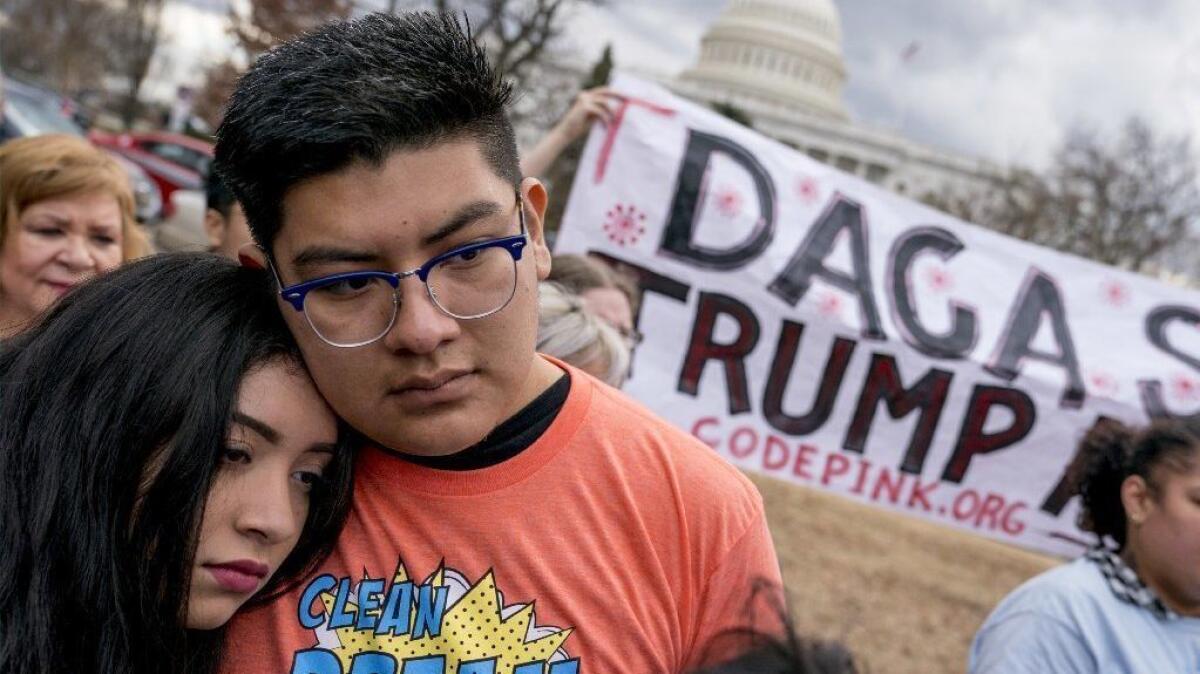Must Reads: Confusion, calculation and fear keeping DACA recipients from renewing their status while they can

Reporting from Washington — For thousands of young men and women living in the U.S. illegally, a judge’s order in January amounted to a reprieve — a chance to renew their legal protections after President Trump’s decision last year to kill the Deferred Action for Childhood Arrivals program.
But many DACA recipients have been slow to reach for the lifeline, according to figures from U.S. Citizenship and Immigration Services. The pace of applications and renewals has picked up dramatically in the last few months, but many DACA recipients are still hanging back.
More than 9,000 people formerly protected by DACA already have lost their status and are now at risk of being deported.
Lawyers, activists and people enrolled in DACA say that part of the reason for the slow pace is confusion spawned by court fights. Part is also anxiety spawned by the unforgiving enforcement policies of the Trump administration.
“We’re telling people, ‘You need to renew.’ The problem is, they don’t trust that anymore,” said Elias Rosenfeld, a student and activist who was able to renew his own DACA protections. “It’s real fragile right now.”
Lawyers say some clients are afraid to put in renewal applications, worried about attracting attention from enforcement agents.
“I think there’s massive anxiety,” said David Leopold, an immigration lawyer in Cleveland. “Look at the president. You don’t know from one day to the next what’s going to happen with this White House.”
Ever since the DACA program was created by President Obama in 2012, after the collapse of immigration reform efforts in Congress, it has been a rallying point for immigrant advocates — and a target for the anti-immigration wing of the Republican Party.
Under DACA, people living here illegally with otherwise clean records — often referred to as Dreamers — can receive a two-year reprieve from deportation. Close to 800,000 of them have had an opportunity to work legally and attend school as DACA recipients.
Last September, the administration announced an end to the program, with an immediate cutoff in new applications and a tight window to renew for people whose protections were running out.
But the program was restarted after a Jan. 10 decision by U.S. District Judge William Alsup in San Francisco, who said that the administration relied on flawed legal reasoning by Atty. Gen. Jeff Sessions in ending the program; federal judges in Brooklyn and Washington, D.C., subsequently wrote similar decisions.
Renewal applications were slow to come in after the window reopened on Jan. 10 — just 11,000 through Jan. 31. U.S. Citizenship and Immigration Services didn’t approve any of them at first, statistics show.
But more than 59,000 applications came in during February and March, and 32,000 were approved, the figures show. All told, counting applications already in the pipeline before January, the agency approved more than 55,000 applications in the first three months of the year. Another 51,000 were pending on March 31, a jump from December.
The future of DACA is a bigger issue in Southern California than anywhere else in the U.S. Of the 694,000 people who currently hold DACA protections, nearly 200,000 are from California, with about 62% living in the Los Angeles, Riverside and San Diego metro regions, according to Citizenship and Immigration Services.
Rosenfeld, 20, was brought to the U.S. from Venezuela when he was 6. He entered on a legal visa, but his mother died when he was 10, which meant he couldn’t renew the visa and fell out of legal status. Now a student at Brandeis University, he spends much of his time in Washington, lobbying members of Congress for legislation protecting Dreamers.
With his original DACA permit due to expire this August, Rosenfeld was shut out by last year’s order ending the program. The court decision reversing that order allowed him to apply for renewal.
“It was an immediate blessing,” he said. “It at least extends our future in this country for two more years.”
The federal statistics tell a story of thousands of procrastinations, private calculations and personal gambles. Many DACA recipients seemingly are betting that the courts will keep the doors to DACA open, at least for this year. There’s a disincentive to applying too early: Renewals are good for two years from the day they’re issued, not two years added on to the original period.
The decisions to wait could collectively add up to trouble later this year, assuming the program remains in effect. Of the 165,210 people whose DACA protections expire from June to December, only about 12% have applied for renewal, according to figures through March 31, suggesting that a surge is coming, along with possible bottlenecks in an already slow system.
A Citizenship and Immigration Services spokesman said the agency is handling DACA applications as they arrive, with a goal of deciding them within 120 days, though lawyers say the agency often takes longer.
“I think it’s a real difficult decision,” said Nicole Prchal Svajlenka, a senior policy analyst at the left-leaning Center for American Progress who has been tracking the DACA statistics. “Do you apply now and take what you can get, or wait and hope?”
Svajlenka also blamed Citizenship and Immigration Services for not doing more to publicize the program’s revival, leaving advocacy groups to try to sort out the muddle created by the agency’s complicated deadlines and the court orders.
“I think there’s a ton of confusion over what’s going on with DACA anymore,” she said.
The growing hostility of Trump to the program also has people nervous. Earlier this year, when he was pushing for a deal with Congress, Trump said he was looking for a “bill of love” to protect Dreamers, but that affection curdled quickly after negotiations fell apart.
Now, incensed about asylum seekers and the slow pace of his promised border wall, Trump tweeted April 2 that “DACA is dead” and “NO MORE DACA DEAL!”
The legal future of DACA also is far from secure. Last month, seven states seeking to end the program filed suit in federal court in Texas, where judges have been more skeptical of the Obama administration’s immigration policies. If there are competing court decisions, that could hasten a review by the U.S. Supreme Court.
Sonia S. Figueroa, an immigration lawyer in Los Angeles, said that she’s advising clients to apply now, while the window is still open.
“If they’re going to jack you, they’re going to jack you anyway, so it makes no difference if you apply or not” in that regard, she said. At the same time, she said, she advises clients to keep a low profile, just in case, particularly now that agents are scrutinizing social media accounts.
“We tell our clients, don’t post anything, period,” Figueroa said.
One DACA recipient who didn’t wait is Bernard Pastor, 25, who came to the U.S. at age 3 during the civil war in Guatemala. Pastor, now of Finneytown, Ohio, near Cincinnati, had allowed his DACA protections to lapse and was allowed to reapply only after the court decision in January. His application is pending.
“It’s a sigh of relief if I’m on it,” he said. He knows the extension, if it comes, may just be temporary. But Pastor, who manages a Valvoline oil-change shop, said he’s not putting his life on hold anymore, no matter what, and is pressing ahead with plans to build a family and a career.
“The issue of immigration is always going to be there; I’ve accepted that fact,” he said. “But I’ve been grateful. I’m making the most of what I can, with what I have. You’ve got to start looking at your future now.”
Twitter: @jtanfani
More to Read
Get the L.A. Times Politics newsletter
Deeply reported insights into legislation, politics and policy from Sacramento, Washington and beyond. In your inbox three times per week.
You may occasionally receive promotional content from the Los Angeles Times.











